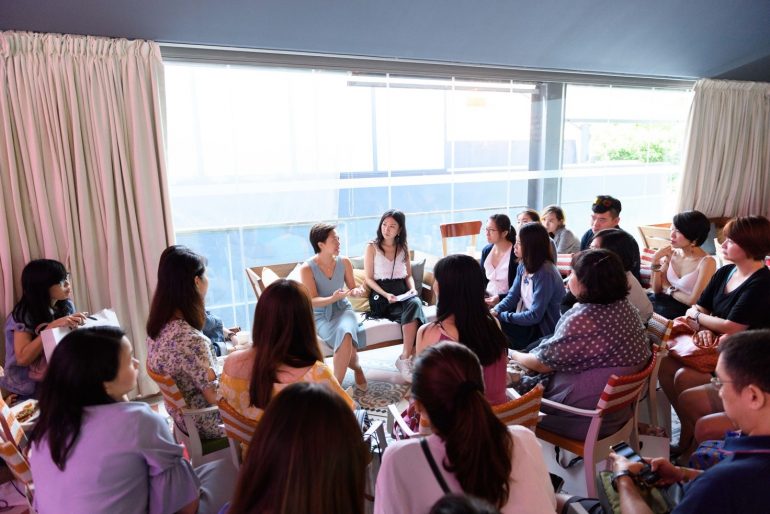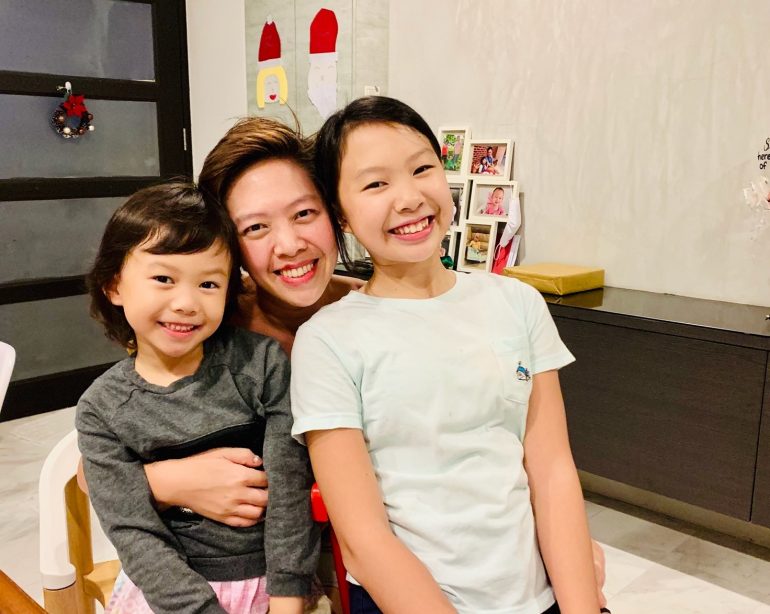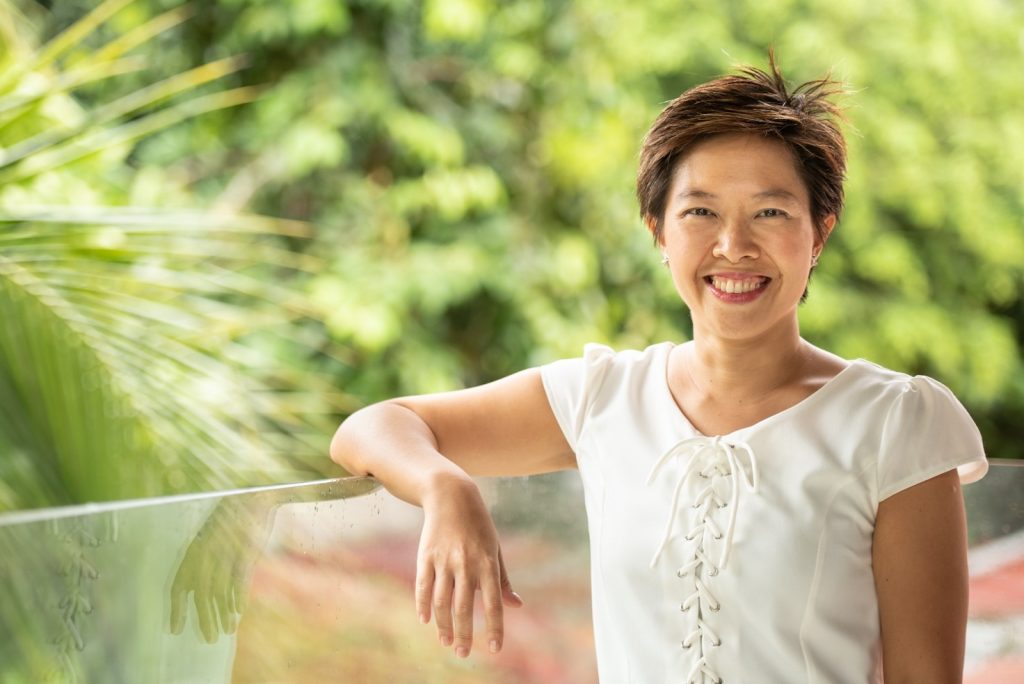Sha-En Yeo is no stranger in all matters relating to happiness and mental health. She graduated with a Masters in Applied Positive Psychology from the University of Pennsylvania and since then, has been on the path to train organisations, schools, parents, and individuals in this whole business of finding and sustaining happiness. Passionate about sharing her wealth of knowledge, she set up Happiness Scientists in 2019 and has trained over 20,000 people in Singapore and beyond! This number one best-selling author has also been featured in MyExecutive, Chasing Happiness documentary, CNA938, MONEY 89.3FM, and Business Times’ “A Formula for Happiness” and “The Meaning of Life”.
Mummyfique chats with this happiness guru, accomplished writer, and mum of two girls, on what drives her passion to support parents on their positive parenting journey!
Tell us a little about yourself.
My name is Sha-En and I am the Founder of Happiness Scientists! I am a free-spirited idealist who believes that all of us can contribute positively to this world in the lifetime that we have. Through my work with schools and companies, I hope to be able to empower people to use their strengths and live a fulfilling life.
How many kids do you have and how old are they now?
I have two beautiful daughters, the elder is twelve and the younger is seven years old.
Did you have a role model while growing up?
I looked up to my teacher whom I met in secondary school. She believed in me and inspired me to believe in myself. If not for her, I believe my life would have taken a different trajectory.
How will you define your parenting style? Share with us more!
My parenting style is “firm but kind”. There are some non-negotiables like values that I am very firm about. However, if my kids make mistakes, I’m usually forgiving and allow for second chances. Also, I love playing and getting to know what their interests are. They know that I mean what I say, and they also know when we can tease and have fun as well.
What is Positive Psychology and why the interest to further your studies in this discipline?
Positive Psychology is the scientific study of well-being. Years of research support that there are effective strategies that we can use to increase our well-being and manage the areas of our life where we struggle. I got to learn about Positive Psychology back when I was a teacher in 2005 and was intrigued by the thought that concepts like resilience and optimism can be taught or learnt. After using the strategies that I had learnt with my students (and myself), I saw how powerful they were. That inspired me to further my studies at the University of Pennsylvania in 2010.
How did you get into this business of Happiness?
After graduating from university, I knew that this was a field I wanted to be in. It was empowering, uplifting and more importantly, there was (and still is) a great need in the world. Of course, at first I didn’t know what it was like to run a business. I was just passionate about it and shared it with anyone who wanted to know more about it. Thankfully, there were some companies and schools who were early adopters. From then on, my business grew through word of mouth and referrals.
What are the key services you provide to families at Happiness Scientists?
I provide workshops and coaching for families, who are keen to use the strategies I teach to cultivate a positive family environment. Sometimes this means creating the space for them to reflect on their own parenting practices, philosophy and then decide what will work best in their own family.

What was the greatest challenge you faced as a trainer and speaker in the area of positive parenting?
The greatest challenge is when parents choose to stick to their style of parenting especially when it is not helpful for them and their children. I can identify with the issues they are facing and can share how to support them, however as I am not family, ultimately it comes down to parents to take action and to make it happen. As a speaker and trainer, my hope is to empower them and also inspire them. For example, I have met parents who discipline their children by using the cane. I respect that they do this sometimes because they are at their wits end. However, using the cane without explaining to their children why or just to stop a behaviour, doesn’t mean they actually learn what is the correct thing to do instead. Using physical means to discipline your child too often can result in trauma which is the feeling that they are all alone or that they somehow are “bad” children who aren’t worthy. It pains me to see that some parents recognise the issue, but sometimes choose not to make any changes.
How can we, as parents, support and safeguard our children’s mental wellness?
We must recognise that our children are still growing and prone to making mistakes. It is through these mistakes that they learn and grow. We can provide a safe space for them by being understanding and guiding them step by step when they don’t know how to do something. Also, we can practice talking less and listening more. Sometimes they want to know that you are there for them and listening non-judgmentally can go a long way. We don’t always have to offer advice when they are stuck. We can also create a positive environment where we identify and share with them what they can do, the strengths they have, and foster a sense of gratitude and joy. Children who are supported in this way will feel secure and loved, and that allows them to face challenges with greater resilience.
If there was one piece of advice you’d give to mums who are struggling to manage their children’s stresses, what would it be?
I would say, focus on managing your own stress first. Sometimes, we tend to focus so much on our children, that even if we are overwhelmed or stressed out, we brush it aside. Children are very sensitive and can sense when you are stressed too. When you are able to take care of yourself, you are also in a better state to talk to them, listen to them and support them.

My favourite aspect of being a trainer and speaker in the area of happiness and well-being is…
Being able to help people see that they can create a more fulfilling life for themselves. What this means is that they have the keys to unlock their happiness!
My proudest achievement with Happiness Scientists is…
Teaching fellow educators and empowering schools because they then can spread these principles and strategies to students, resulting in thousands of students and families being positively impacted. Hopefully this will provide a stronger mental health foundation for the next generation.
What is one thing you would have done differently when setting up Happiness Scientists?
I would have found a partner who has different strengths than mine, to be able to scale up the business more rapidly.
Positive parenting in three words…
Above all, love.
My favourite moment of the day is…
The peace and quiet of the morning when I have time to centre myself before the day begins.
What I love to do on days when I’m not working is/are…
Relax, have fun with the children, and eat good food.
Best parenting advice received?
Don’t beat yourself up when you make mistakes. Parenting is a journey that we are walking, and we learn as well as grow as our children grow.
Worst parenting advice received?
Don’t tell them what you’re going through or share your stories because they are not able to understand.
Your plans for the future? Personal and work?
I’m looking forward to growing the business to the next level by developing a certification program for people who are also passionate about equipping others with the tools and strategies of Happiness. With more certified professionals, it means that more people can get access to these valuable strategies and use them to support themselves or others. Personally, I’m looking forward to seeing my elder transition into secondary school and spending more time with my younger one as she goes through the next few years of primary school. Hopefully, since the Vaccinated Travel Lanes have opened up, there will be more opportunities to travel as a family and share new experiences.



